Notes and references
Notes
- ↑ In the stage directions for act 2, scene 1, there is also "a kinsman" that has no other apparent role in the play. Claire McEachern, in The Arden Shakespeare third series edition of the play, speculates that this "kinsman" might be the same person Leonato mentions to Antonio in act 1, scene 2: "where is my cousin your son? Hath he provided this music?" [6] However, by act 5, scene 1 Leonato claims that "My brother hath a daughter, ... And she alone is heir to both of us." [7] and in act 4, scene 1, when Benedick has refused to kill Claudio, Beatrice makes no mention of a brother or cousin that might take up the task. [8] [5]
- ↑ Twice, but the first was a kinsman of Titus with a single non-speaking appearance in Titus Andronicus . [18]
- ↑ Shakespeare may have picked up the name from Valentine and Orson , a romance associated with the Matter of France and the, now lost, 14th-century chanson de geste Valentin et Sansnom. Porter finds some similarities between Orson, Valentine's lost brother that has been raised by a bear, and Shakespeare's Mercutio, suggesting possible mirroring between the Orson–Valentine and Mercutio–Valentine dyads. This association of the name with brotherhood may also have been strengthened by Valentinian I (321–375) and Valens (328–378), brothers who concurrently ruled the Western and Eastern Roman Empire and frequently issued joint edicts. [19]
Related Research Articles

Romeo and Juliet is a tragedy written by William Shakespeare early in his career about the romance between two Italian youths from feuding families. It was among Shakespeare's most popular plays during his lifetime and, along with Hamlet, is one of his most frequently performed. Today, the title characters are regarded as archetypal young lovers.
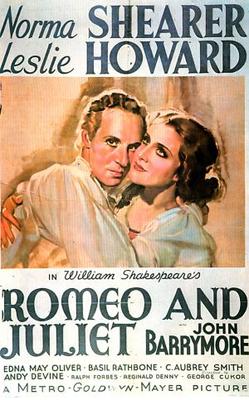
Romeo and Juliet is a 1936 American film adapted from the play by William Shakespeare, directed by George Cukor from a screenplay by Talbot Jennings. The film stars Leslie Howard as Romeo and Norma Shearer as Juliet, and the supporting cast features John Barrymore, Basil Rathbone, and Andy Devine.
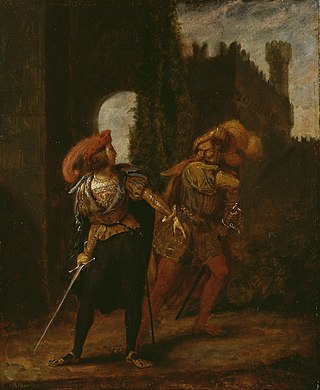
Tybalt is a character in William Shakespeare's play Romeo and Juliet. He is the son of Lady Capulet's brother, Juliet's short-tempered first cousin, and Romeo's rival. Tybalt shares the same name as the character Tibert / Tybalt "the prince of cats" in the popular story Reynard the Fox, a point of mockery in the play. Mercutio repeatedly calls Tybalt "prince of cats", in reference to his sleek, yet violent manner.

Mercutio is a fictional character in William Shakespeare's 1597 tragedy, Romeo and Juliet. He is a close friend to Romeo and a blood relative to Prince Escalus and Count Paris. As such, Mercutio is one of the named characters in the play with the ability to mingle around those of both houses. The invitation to Lord Capulet's party states that he has a brother named Valentine.

Benvolio Montague is a fictional character in William Shakespeare's tragedy Romeo and Juliet. He is Lord Montague's nephew and Romeo's cousin. Benvolio serves as an unsuccessful peacemaker in the play, attempting to prevent violence between the Capulet and Montague families.
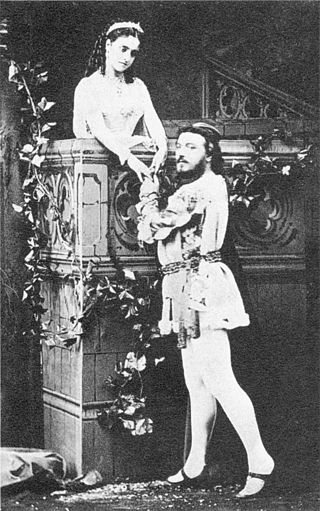
Roméo et Juliette is an opera in five acts by Charles Gounod to a French libretto by Jules Barbier and Michel Carré, based on Romeo and Juliet by William Shakespeare. It was first performed at the Théâtre Lyrique, Paris on 27 April 1867. This opera is notable for the series of four duets for the main characters and the waltz song "Je veux vivre" for the soprano.

Juliet Capulet is the female protagonist in William Shakespeare's romantic tragedy Romeo and Juliet. A 13-year-old girl, Juliet is the only daughter of the patriarch of the House of Capulet. She falls in love with the male protagonist Romeo, a member of the House of Montague, with which the Capulets have a blood feud. The story has a long history that precedes Shakespeare himself.
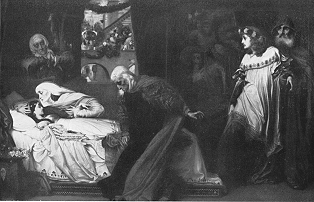
Count Paris or County Paris is a fictional character in William Shakespeare's Romeo and Juliet. He is a suitor of Juliet. He is handsome, wealthy, and a kinsman to Prince Escalus.
After Juliet is a play written by Scottish playwright Sharman Macdonald. It was commissioned for the 2000 Connections programme, in which regional youth theatre groups compete to stage short plays by established playwrights.

Much Ado About Nothing is a comedy by William Shakespeare thought to have been written in 1598 and 1599. The play was included in the First Folio, published in 1623.

Romeo and Juliet is a 1954 film adaptation of the Shakespearean tragedy of the same name. It is directed and written for the screen by Renato Castellani, and stars Laurence Harvey as Romeo and newcomer Susan Shentall as Juliet, with Flora Robson, Mervyn Johns, Bill Travers, Sebastian Cabot, Enzo Fiermonte and John Gielgud. A British and Italian co-production, it was released in the United Kingdom by General Film Distributors on September 1, 1954.
Rosaline is a fictional character mentioned in William Shakespeare's tragedy Romeo and Juliet. She is the niece of Lord Capulet. Although an unseen character, her role is important: Romeo's unrequited love for Rosaline leads him to try to catch a glimpse of her at a gathering hosted by the Capulet family, during which he first spots her cousin, Juliet.
William Shakespeare's Romeo and Juliet may be one of the most-screened plays of all time. The most notable theatrical releases were George Cukor's multi-Oscar-nominated 1936 production Romeo and Juliet, Franco Zeffirelli's 1968 film Romeo and Juliet, and Baz Luhrmann's 1996 MTV-inspired Romeo + Juliet. The latter two were both, at the time, the highest-grossing Shakespeare films. Cukor featured the mature actors Norma Shearer and Leslie Howard as the teenage lovers while Zeffirelli populated his film with beautiful young people, and Baz Luhrmann produced a heavily cut fast-paced version aimed at teenage audiences.
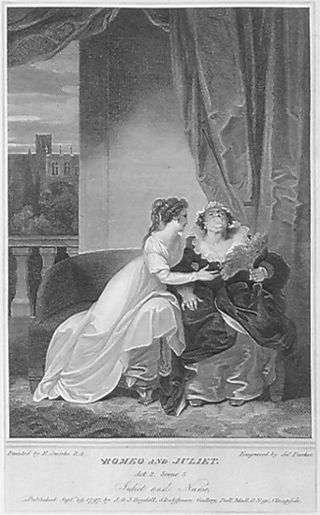
The Nurse is a character in William Shakespeare's classic drama Romeo and Juliet. She is the personal servant, guardian of Juliet Capulet, and has been since Juliet was born. She had a daughter named Susan who died in infancy, and then became wetnurse to Juliet. As the primary person to like, she is therefore Juliet's foremost confidante. She is very important to Juliet's life.
William Shakespeare's play Romeo and Juliet, set in Verona, Italy, features the eponymous protagonists Romeo Montague and Juliet Capulet. The cast of characters also includes members of their respective families and households; Prince Escalus, the city's ruler, and his kinsman, Count Paris; and various unaffiliated characters such as Friar Laurence and the Chorus. In addition, the play contains two ghost characters and an unseen character (Rosaline).
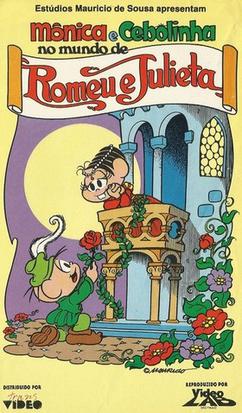
Mônica e Cebolinha: No Mundo de Romeu e Julieta is a film adaptation of Romeo and Juliet by William Shakespeare, starring Monica's Gang. It was originally staged at theater in 1978 with a comic and LP adaptation out in the same year. In 1979 the feature film adaptation of the play was released, filmed in Ouro Preto, as a special for the Children's Day on Rede Bandeirantes. Along with A Rádio do Chico Bento, is one of the two films inspired by Mauricio de Sousa characters completely done in live-action.
Imogen Says Nothing: The Annotated Life of Imogen of Messina, last sighted in the First Folio of William Shakespeare's Much Adoe About Nothing is a three-act play by Aditi Brennan Kapil inspired by a ghost character in Shakespeare's Much Ado About Nothing. The play premiered on January 20, 2017 at the Yale Repertory Theatre.
References
- ↑ Smidt 1980.
- ↑ Boyce 1990.
- ↑ Wells 1980, p. 1.
- ↑ Much Ado About Nothing1.1/0 , Folger Shakespeare Library
- 1 2 3 McEachern 2007, pp. 138–140.
- ↑ Much Ado About Nothing1.2/1–2, Folger Shakespeare Library|bare=true}}
- ↑ Much Ado About Nothing5.1/301–303
- ↑ Much Ado About Nothing4.1/0
- ↑ Much Ado About Nothing4.1/0
- ↑ Clark & Wright 1863, p. 89, note 1.
- ↑ Digital Theatre. "Much Ado About Nothing". The Internet Archive. Retrieved 13 September 2022.
- ↑ Weis 2012, p. 156, note 0.1–2.
- 1 2 3 4 Porter 1984, p. 31.
- ↑ Romeo and Juliet1.2/73
- ↑ Romeo and Juliet3.1/74–113
- ↑ Hosley 1954, p. 171.
- ↑ Romeo and Juliet1.5/0
- ↑ Porter 1984, p. 34.
- ↑ Porter 1984, p. 35–36.
- ↑ Bloom 2000, p. 158.
- ↑ Porter 1984, p. 37.
- ↑ Porter 1984, p. 36–38.
- ↑ Wiggins 1997, p. 448.
- ↑ George Peele. The Famous Chronicle of King Edward the First . edited by Frank S. Hook. Yale University Press, 1961, p. 71.
Sources
- Bloom, Harold, ed. (2000). William Shakespeare's Romeo and Juliet . Modern Critical Interpretations. Philadelphia: Chelsea House. ISBN 0-7910-5662-7.
- Boyce, Charles (1990). White, David Allen (ed.). Shakespeare A to Z: The Essential Reference to His Plays, His Poems, His Life and Times, and More. Literary A to Z. Facts on File. ISBN 9780816018055.
- Clark, William George; Wright, William Aldis, eds. (1863). The Cambridge Shakespeare. Vol. II. Cambridge: Cambridge University Press. doi:10.1017/CBO9780511701207. ISBN 9780511701207 – via Cambridge Core.
- Hosley, Richard, ed. (1954) [first published 1917]. The Tragedy of Romeo and Juliet. The Yale Shakespeare (revised ed.). New Haven: Yale University Press. hdl: 2027/mdp.39015054267862 . OCLC 572840900.
- McEachern, Claire, ed. (2007). Much Ado About Nothing. The Arden Shakespeare, third series. Bloomsbury. doi:10.5040/9781408160220.00000052. ISBN 978-1-9034-3683-7.
- Porter, Joseph A. (1984). "Mercutio's Brother". South Atlantic Review . 49 (4). South Atlantic Modern Language Association: 31–41. doi:10.2307/3199586. eISSN 2325-7970. ISSN 0277-335X. JSTOR 3199586.
- Smidt, Kristian (1980). "Shakespeare's absent characters". English Studies . 61 (5). Taylor & Francis: 397–407. doi:10.1080/00138388008598068. eISSN 1744-4217. ISSN 0013-838X.
- Weis, René, ed. (2012). Romeo and Juliet. The Arden Shakespeare, third series. Bloomsbury Publishing. doi:10.5040/9781408160152.00000039. ISBN 9781903436912.
- Wells, Stanley (1980). "Editorial Treatment of Foul-Paper Texts: Much Ado about Nothing as Test Case". The Review of English Studies . New Series. 31 (121). Oxford University Press: 1–16. doi:10.1093/res/XXXI.121.1. eISSN 1471-6968. ISSN 0034-6551. JSTOR 514047.
- Wiggins, Martin (1997). "Conjuring the Ghosts of The White Devil". The Review of English Studies . New Series. 48 (192). Oxford University Press: 448–470. doi:10.1093/res/XLVIII.192.448. eISSN 1471-6968. ISSN 0034-6551. JSTOR 518492.
